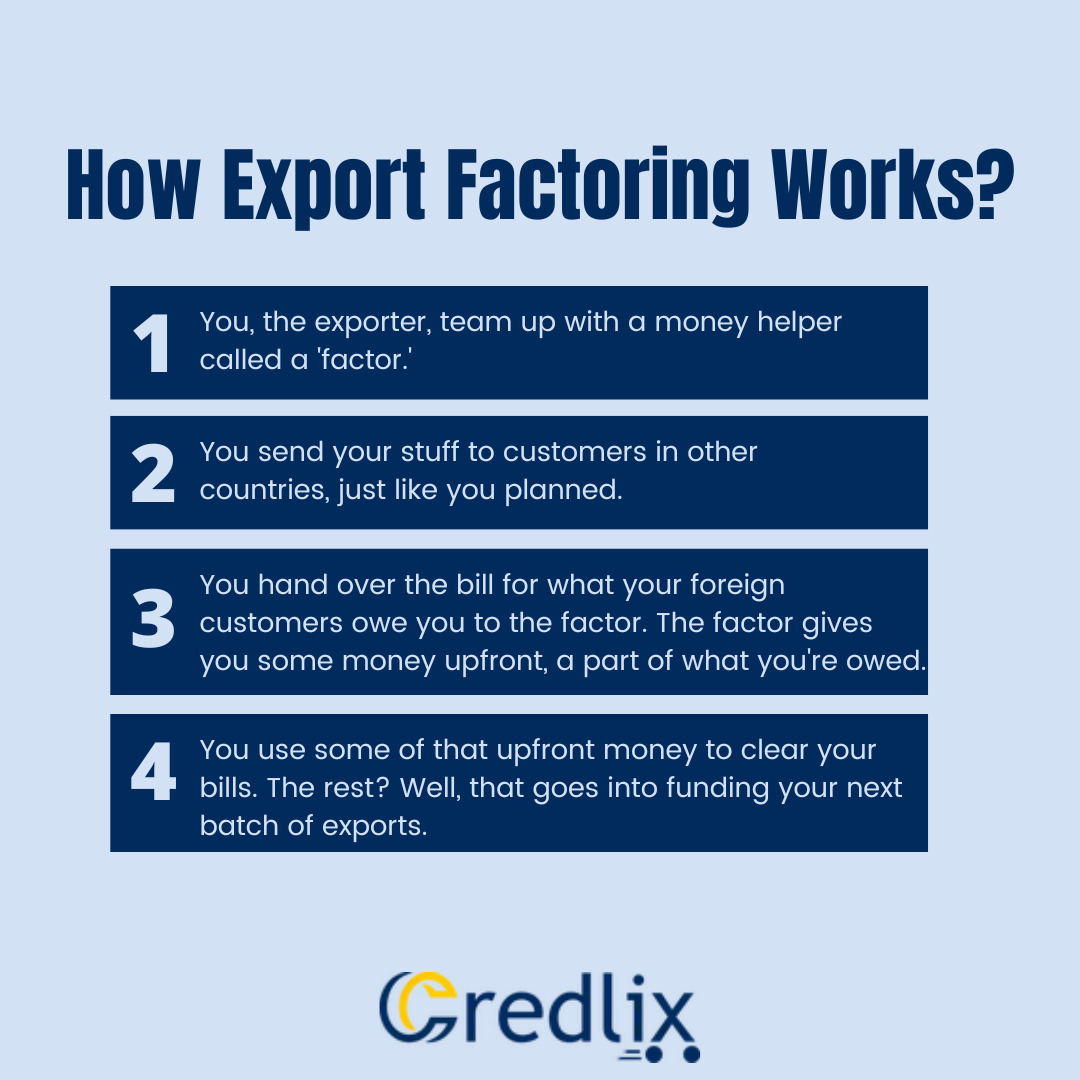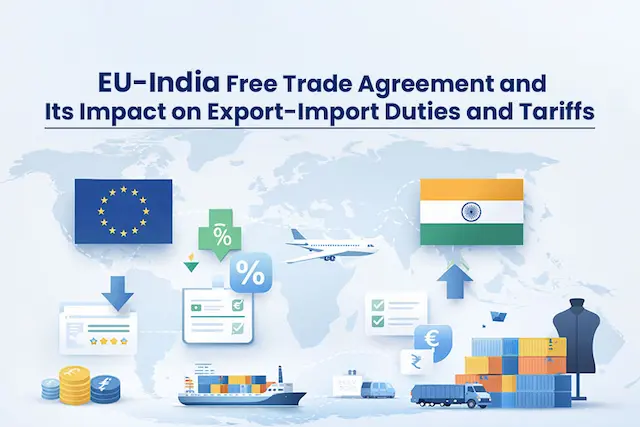In the e-commerce world, global expansion offers immense opportunities for businesses to tap into new markets and diversify their customer base. However, with this growth comes the challenge of managing cash flow, especially when dealing with international transactions.
In this comprehensive blog, we delve into the world of export factoring solutions and how they can serve as a strategic financial tool for online global businesses seeking to overcome financial hurdles and propel their expansion initiatives.
What is Export Factoring?
Export factoring is a financial arrangement where a specialized institution, known as a factor, purchases the accounts receivable of a business at a discounted rate. This mechanism allows businesses to convert their outstanding invoices into immediate cash, providing a crucial injection of liquidity that is often vital for sustained operations and expansion efforts.
Types of Export Factoring That are Best for Online Global Businesses

Export factoring comes in different forms, and the choice of the most suitable type depends on the specific needs and characteristics of the online global business. Here are some types of export factoring that are particularly well-suited for online global businesses:
Recourse Factoring
In recourse factoring, the factor provides financing against the accounts receivable, but the business retains the ultimate responsibility for any non-payment by the customer. While this may involve more risk for the business, it often comes with lower fees. Recourse factoring can be suitable for online businesses with established risk management practices and a lower tolerance for factoring costs.
Non-Recourse Factoring
Non-recourse factoring shifts the credit risk from the business to the factor. In this arrangement, if a customer fails to pay due to insolvency or other specified reasons, the factor absorbs the loss. This type of factoring is beneficial for online global businesses dealing with international customers where credit risk may be higher and harder to assess. It provides an additional layer of protection against non-payment.
Also Read: How Export Factoring is Better Than Bank Loans
The Working Process of Export Factoring
Understanding how export factoring operates is crucial for businesses considering this financial solution. The process typically involves the following steps:
Invoice Submission: The business, after completing a transaction with an international customer, submits the corresponding invoice to the factor. This marks the initiation of the factoring process.
Advance Payment: Upon receiving the invoice, the factor performs due diligence and verification. Once the verification is complete, the factor advances a significant percentage (usually ranging from 70% to 90%) of the invoice value to the business. This immediate injection of funds is instrumental in addressing cash flow gaps.
Collection and Remaining Payment: The factor takes on the responsibility of collecting payments from the customers. Once the customer settles the invoice, the factor deducts its fees and discount charges and remits the remaining balance to the business. This seamless process allows businesses to focus on core operations while the factor manages the intricacies of receivables.
Also Read: How Export Factoring Can Mitigate Risks in International Trade
The Benefits for Online Global Businesses
Here are some of the benefits of Export Factoring for online global business:
Cash Flow Improvement: Online businesses, characterized by diverse customer bases and global reach, often face challenges related to delayed payments and extended credit terms. Export factoring serves as a powerful solution by accelerating cash flow. The ability to access funds swiftly enables businesses to reinvest, meet operational expenses, and seize growth opportunities promptly.
Risk Mitigation: International transactions introduce complexities such as currency fluctuations and uncertainties regarding payment reliability. Export factoring provides a layer of risk mitigation as factors often offer credit protection against non-payment by customers. This becomes especially crucial when venturing into unfamiliar global markets.
Global Expansion Support: The working capital provided by export factoring becomes a catalyst for businesses looking to expand globally. Whether it’s covering production costs, facilitating international shipping, or launching targeted marketing campaigns in new regions, the financial support from factoring paves the way for successful expansion strategies.
Outsourced Credit Management: Managing international credit risks can be a daunting task for businesses. Export factoring alleviates this burden by outsourcing credit management to the factor. This not only saves time and resources but also ensures that professionals adept in international credit dynamics handle these critical aspects.
Flexibility: Export factoring offers a high degree of flexibility, allowing businesses to tailor the arrangement to their specific needs. Whether a business prefers to factor all invoices or only select ones, the adaptability of export factoring makes it a versatile financial solution.
Enhanced Competitive Edge: In the fiercely competitive world of e-commerce, having a robust financial strategy is a key differentiator. Export factoring provides businesses with the financial agility to stay ahead of competitors. The ability to secure immediate funds allows businesses to capitalize on emerging market trends, invest in innovation, and adapt to changing consumer preferences swiftly. This enhanced competitive edge positions online global businesses as agile players capable of navigating the dynamic landscape of the e-commerce industry.
Strengthened Supplier Relationships: For online businesses engaged in global trade, maintaining strong relationships with suppliers is vital. Export factoring not only benefits businesses directly but also has a positive ripple effect on their supply chain. With improved cash flow, businesses can ensure timely payments to suppliers, negotiate favorable terms, and build trust-based partnerships. Strengthened supplier relationships contribute to a more resilient and efficient supply chain, further bolstering the overall stability of the online global business.
Strategic Planning and Forecasting: Export factoring provides businesses with a predictable and consistent cash flow stream, enabling more accurate financial planning and forecasting. With a clear understanding of incoming funds from factored invoices, businesses can make informed decisions regarding inventory management, marketing campaigns, and expansion initiatives. This strategic advantage enhances the overall financial planning process, reducing uncertainties and facilitating long-term growth strategies for online global businesses.
Export Factoring Considerations for Online Businesses
While export factoring offers numerous advantages, businesses should be mindful of certain considerations before incorporating this financial solution into their strategy:
Costs: While the immediate liquidity provided by export factoring is invaluable, businesses must be aware of the associated costs. These can include factoring fees, discount charges, and other expenses. Conducting a thorough cost-benefit analysis is crucial to assess the overall impact on the bottom line.
Customer Perception: Some businesses may be concerned about how their customers perceive the involvement of a third party in the invoicing and payment process. Transparent communication with customers about the benefits and reasons for employing export factoring is essential to maintain healthy business relationships.
Contractual Agreements and Terms: Before engaging in export factoring, businesses should carefully review the contractual agreements and terms presented by the factoring company. This includes understanding the duration of the contract, any minimum volume requirements, and the conditions for terminating the agreement. Clarity on these aspects ensures that businesses can make informed decisions and have the flexibility to adapt their financial strategy as needed.
Impact on Profit Margins: While export factoring provides immediate liquidity, businesses need to assess its impact on profit margins. The discount charges and factoring fees associated with the service can erode profit margins if not carefully managed. Businesses should weigh the benefits of improved cash flow against the costs incurred, ensuring that the overall financial health and profitability of the company remain sustainable.
Regulatory Compliance and Legal Considerations: Operating on a global scale involves navigating diverse regulatory landscapes. Businesses utilizing export factoring must ensure compliance with international trade regulations and legal requirements. Understanding the legal implications and ensuring that the chosen factoring solution aligns with local and international laws is crucial. Failure to do so could result in legal complications that may negatively impact the business’s reputation and operations.
Also Read: Key Factors to Look for When Evaluating Export Factoring Services
Conclusion
Export factoring emerges as a strategic and potent financial solution for online global businesses embarking on e-commerce expansion. By addressing the challenges of cash flow management, mitigating international trade risks, and providing the necessary working capital for global initiatives, export factoring proves to be a valuable ally in the pursuit of sustained growth and success in the competitive world of e-commerce.
As businesses navigate the complexities of international trade and seek avenues for expansion, export factoring stands out as a dynamic and adaptable financial tool. The ability to enhance cash flow, manage credit risks, and support global expansion makes export factoring a compelling choice for businesses looking to thrive in the interconnected and ever-evolving landscape of online commerce.




